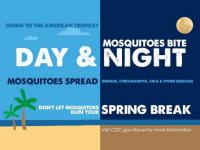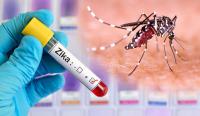-
More corrosion-resistant water pipes could preventing another Flint, Mich. health crisis
Corrosion-related damage costs more than three percent of the United States’ Gross Domestic Product (about $503.1 billion, going by 2013 numbers). With documented public water problems in Flint, Michigan, and Hoosick Falls, New York, caused by corrosion, understanding how copper is affected at the atomic level is critical to avoiding problems in future pipes.
-
-
Illegal mining in Colombia linked to malaria outbreak
The Colombian National Health Institute recorded 18,524 malaria cases in 2015. The year before, only 4,730 malaria cases were recorded. The sharp increase in the number of malaria cases in different areas of Colombia has been linked to illegal open-cast mining. Stagnant water and poor sanitary conditions have been discovered at these often hidden rural locations.
-
-
Cellphone-sized device detects the Ebola virus quickly

The worst of the recent Ebola epidemic is over, but the threat of future outbreaks lingers. Monitoring the virus requires laboratories with trained personnel, which limits how rapidly tests can be done. Now scientists report in ACS’ journal Analytical Chemistry a handheld instrument that detects Ebola quickly and could be used in remote locations.
-
-
What we learned from Chernobyl about how radiation affects our bodies
The world has never seen a nuclear accident as severe as the one that unfolded when a reactor exploded in Chernobyl on 26 April 1986, sending vast amounts of radiation into the skies around Ukraine, Belarus and Russia. The planet had experienced massive releases like this before, in the bombings of Hiroshima and Nagasaki in 1945. But Chernobyl-related radiation exposure had a more protracted character. It was the first time in history that such a large population, particularly at a very young age, was exposed to radioactive isotopes, namely iodine-131 and cesium-137, not just through direct exposure, but through eating contaminated food as well.
-
-
The legacy of Chernobyl -- 30 years on
The 26 April 2016 marks the 30th anniversary of the Chernobyl nuclear accident. For many, especially those born since 1986, it is a word they know without appreciating the full significance of what happened on that day. For others, it was a life changing catastrophe which resulted in largest release of radioactivity in the history of nuclear energy.
-
-
Dealing with irradiated nuclear graphite

Since the beginning of the nuclear power industry, a large number of channel uranium-graphite nuclear power reactors was built across the world. To date, they all are on the output stage of the operation or decommissioning preparation. Approximately 250,000 tons of irradiated graphite are accumulated in the world, including ~ 60,000 tons in Russia. Due to the specificity of irradiated graphite, the treatment of this type of radioactive waste has not been determined yet.
-
-
Forget Fukushima: Chernobyl still holds record as worst nuclear accident for public health
The 1986 Chernobyl and 2011 Fukushima nuclear power plant accidents both share the notorious distinction of attaining the highest accident rating on the International Atomic Energy Agency (IAEA) scale of nuclear accidents. No other reactor incident has ever received this Level 7 “major accident” designation in the history of nuclear power. But the IAEA scale isn’t designed to measure public health impact. Chernobyl is by far the worst nuclear power plant accident of all time. It was a totally human-made event which was made worse by incompetent workers who did all the wrong things when attempting to avert a meltdown. Fukushima in contrast, was an unfortunate natural disaster – caused by a tsunami that flooded reactor basements — and the workers acted responsibly to mitigate the damage despite loss of electrical power. In terms of health ramifications, these two nuclear accidents were not even in the same league. While Fukushima involved radioactivity exposures to hundreds of thousands of people, Chernobyl exposed hundreds of millions. And millions of those received substantially more exposure than the people of Fukushima.
-
-
Changing climate in Michigan poses an emerging public health threat

Changing climate conditions — including warmer temperatures and an increased frequency of heavy rainstorms — represent “an emerging threat to public health in Michigan,” according to a new report from University of Michigan researchers and state health officials.
-
-
Stagnant U.S. funding for tools against infectious diseases leaves U.S., world at serious risk
As Congress grapples with the White House on how to fund an emergency response to fight Zika virus, a new report warns that overall underfunding for development of lifesaving tools against neglected global diseases is putting the United States and the world at risk, and that emergency funding cannot be allowed to substitute for sustained U.S. investment in research and development (R&D) of global health technologies. A recent study that examined the risk of infectious disease outbreaks projected that large-scale global disease pandemics could cost the global economy more than $60 billion a year, while investing in the interventions needed to protect against these outbreaks, including R&D, would cost only a fraction of that — $4.5 billion — each year.
-
-
Congress’ inaction hobbles U.S. preparation for a major Zika virus outbreak: Experts

Despite dire predictions that the Zika virus could affect much of the United States including large cities this summer, the country is unprepared, and the financial and moral consequences could be significant. Earlier this year, President Barack Obama requested $1.86 billion for surveillance, mosquito control, research and health services, but Congress has not approved the funding. In the absence of Congressional action, the president reallocated $589 million of designated Ebola funds to Zika preparedness, research and the creation of response teams. “The nation’s state of preparedness is compromised by Congress’s inaction on supplemental funding and the weak capacities and powers of states and localities,” two public health experts say.
-
-
New way to clean contaminated groundwater

A team of researchers has helped discover a new chemical method to immobilize uranium in contaminated groundwater, which could lead to more precise and successful water remediation efforts at former nuclear sites. Uranium is present in contaminated groundwater at various sites in the United States as a legacy of Cold War-era processing and waste disposal activities associated with nuclear materials production.
-
-
Zika virus “scarier than we initially thought”: U.S. health officials

Dr. Anne Schuchat from the Centre for Disease Control and Prevention (CDC) said the Zika virus is more of a threat than previously thought. Speaking at a White House press conference, she said there was potential for the virus to spread to more U.S. states than experts first believed. “Most of what we’ve learned is not reassuring. Everything we look at with this virus seems to be a bit scarier than we initially thought,” she told reporters.
-
-
Novel alignment-free sequence descriptors in Zika virus characterization
The recent epidemic of Zika virus infections in South and Latin America has raised serious concerns on its ramifications for the population in the Americas and spread of the virus worldwide. Researchers explain their research on computer-assisted approaches toward surveillance and consequent design of drugs and vaccines to combat the growth and spread of the Zika virus.
-
-
Limited awareness or concern about Zika virus in U.S.

A recent survey by the Associated Press-NORC Center for Public Affairs Research finds that three-quarters of Americans who have heard at least a little about the Zika virus are aware that the virus is linked to birth defects in babies born to infected mothers. However, the survey found that most Americans are unclear about the availability of tests to diagnose Zika and whether or not preventative vaccines and effective medicines exist to treat it.
-
-
Oil, gas wastewater disposal pollutes surface water, harm waterways

Unconventional oil and gas (UOG) operations combine directional drilling and hydraulic fracturing, or “fracking,” to release natural gas and oil from underground rock. This process results in in water pollution which may increase endocrine disrupting chemicals (EDCs) in surface and ground water, exposing populations living near these operations to increased risk of disease. High levels of EDC activity were found in the surface water near a hydraulic fracturing wastewater disposal facility in West Virginia. Approximately 36,000 of these disposal wells are currently in operation across the United States.
-
More headlines
The long view
We Ran the C.D.C.: Kennedy Is Endangering Every American’s Health
Nine former leaders of the Centers for Disease Control and Prevention (CDC), who served as directors or acting directors under Republican and Democratic administrations, serving under presidents from Jimmy Carter to Donald Trrump, argue that HHS Secretary Roert F. Kennedy Jr. poses a clear and present danger to the health of Americans. He has placed anti-vaxxers and conspiracy theorists at top HHS positions, and he appears to be guided by a hostility to science and a belief in bizarre, unscientific approaches to public health.
